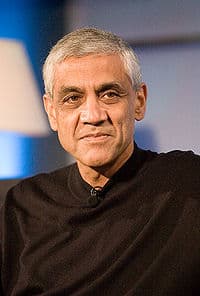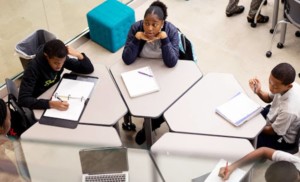Vinod Khosla Asks, ‘Will We Need Teachers Or Algorithms?’

Silicon Valley investor Vinod Khosla published “Will We Need Teachers Or Algorithms” on TechCrush this week, an article that argues we make poor use of teachers’ and students’ talents and training in the United States.
A common misconception about technology in the classroom today is that it will replace teachers. Khosla says it’s quite the contrary. Technology can actually free up teacher’s time for increased social development and other vital areas to students’ education.
“Software can free teachers to have more human relationships by giving them the time to be guidance counselors and friends to young kids instead of being lecturers who talk at them. This last possibility is very important—in addition to learning, schools enable critical social development for children through teacher student relationships and interacting with other children—classrooms of peers and teachers provide much more than math lessons,” says Khosla.
Kholsa identifies two major trends in education today: decentralization and gamification. Decentralization makes curriculum and content available online from just about any device today. What’s more is that it can make learning materials increasingly interactive to engage students in learning new knowledge and ideas.
Khosla references organizations like Khan Academy and CK12.org, which are making content available to students for free on open source platforms. He says developments in these platforms can help teachers become effective guides for students, instilling knowledge for the greatest success in their futures.
“CK12 will allow teachers to guide individuals or for students to guide themselves while being aligned with state (or country) curriculum requirements using any of several different learning modalities (text, video explanations, experimentation, labs, playing with Flexmath, simulations, Q&A bank for students or teachers to self-test, social Facebook-like help for students, and teachers and much more),” says Khosla.
The technology itself gives room for inexpensive customization, experimentation, and assessment that will accelerate innovation in education, says Khosla. Increased access to devices like smartphones, tablets, and laptops will support this shift to increased technology.
Secondly, while the debate around games in education carries on, Kholsa says it holds a great deal of potential in learning. He says, “I firmly believe that we should embrace it and harness its best parts to drive the education of our children who grow up with online and mobile games.”
Recent studies and pilot programs have supported the use of games in education to increase motivation, engagement, and comprehension of math, science, and other concepts. These tools can also be adaptive, moving along at a students’ pace based on mastery of concepts.
Khosla’s points are valid in that it’s not a debate about layoffs for laptops. Rather, it’s discussion of technology for the most efficient application of learning, instruction, and guidance in the classroom. What’s more, technology can empower students to learn and teach independently, as Khosla suggests, with socialization or social learning.
Khosla concludes, “Technology can allow us to make better use of our natural human resources, be they related to our health or to our education.”
Read the full article “Will We Need Teachers or Algorithms?” by Vinod Khosla on Tech Crunch.




Tom Vander Ark
Great article. I'm glad that Vinod and Neeru are working on making CK12.org content more adaptive and engaging. I agree with Vinod that smart recommendation engines will boost persistence and achievement.